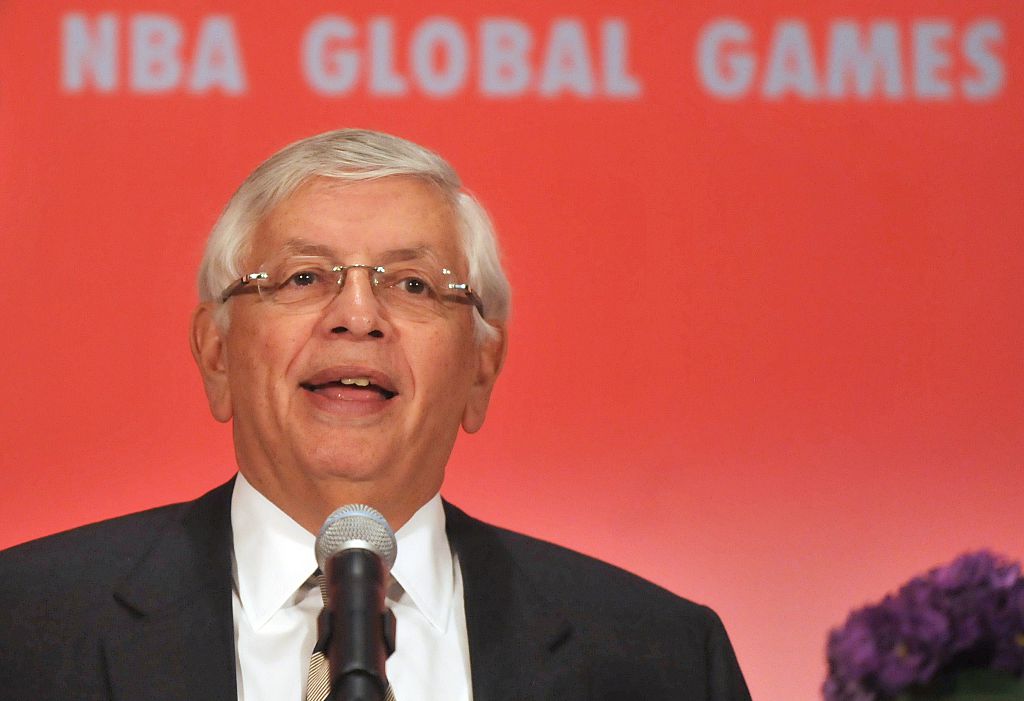David Stern, dead at 77, transformed the NBA into a global powerhouse. He also helped ease the stigma of HIV.


A free daily email with the biggest news stories of the day – and the best features from TheWeek.com
You are now subscribed
Your newsletter sign-up was successful
David Stern, who fundamentally transformed professional basketball during his 30 years as NBA commissioner, died Wednesday. He was 77 and had suffered a brain hemorrhage Dec. 12. When Stern took over as head of the NBA in 1984, the NBA championship game was such a non-event that a few years earlier no network would even broadcast it live. By the time he stepped down in 2014, the NBA was a $5 billion-a-year global juggernaut and basketball one of the world's most popular sports. "David Stern earned and deserved inclusion in our land of giants," said the National Basketball Players Association, with whom Stern sometimes sparred.
Stern oversaw the creation of the WNBA and the expansion of the NBA to 30 teams from 23. The players helped popularize the sport, of course: When Stern took over, the Lakers-Celtics rivalry, led by Magic Johnson and Larry Bird, respectively, had captured the nation's attention, and Michael Jordan joined the NBA a few months after Stern was named commissioner.
Stern is being remembered for his marketing talent and hard-nosed business acumen, but his "most humane, poignant act as commissioner," says Jeff Zillgitt at USA Today, was when he decided to stand by Johnson "when Johnson announced he was HIV-positive on Nov. 7, 1991." Here's how Johnson remembered the moment on Wednesday:
The Week
Escape your echo chamber. Get the facts behind the news, plus analysis from multiple perspectives.

Sign up for The Week's Free Newsletters
From our morning news briefing to a weekly Good News Newsletter, get the best of The Week delivered directly to your inbox.
From our morning news briefing to a weekly Good News Newsletter, get the best of The Week delivered directly to your inbox.
"Nearly 30 years ago, most of the public didn't have a clear understanding of AIDS and HIV," Zillgitt explained, and everyone, including Stern, "thought Johnson was going to die. Stern could have distanced himself and the league from Johnson. He did the opposite. He embraced Johnson, figuratively and literally, and took heat for it." Stern hired experts to educate himself and the league. "Somewhere along the line," Stern told amfAR, the Foundation for AIDS Research, in 2016, "we realized that this was an opportunity to educate the world and to calm down the fear that anyone with HIV should be treated like a leper."
A free daily email with the biggest news stories of the day – and the best features from TheWeek.com
Peter has worked as a news and culture writer and editor at The Week since the site's launch in 2008. He covers politics, world affairs, religion and cultural currents. His journalism career began as a copy editor at a financial newswire and has included editorial positions at The New York Times Magazine, Facts on File, and Oregon State University.
-
 Political cartoons for February 16
Political cartoons for February 16Cartoons Monday’s political cartoons include President's Day, a valentine from the Epstein files, and more
-
 Regent Hong Kong: a tranquil haven with a prime waterfront spot
Regent Hong Kong: a tranquil haven with a prime waterfront spotThe Week Recommends The trendy hotel recently underwent an extensive two-year revamp
-
 The problem with diagnosing profound autism
The problem with diagnosing profound autismThe Explainer Experts are reconsidering the idea of autism as a spectrum, which could impact diagnoses and policy making for the condition
-
 TikTok secures deal to remain in US
TikTok secures deal to remain in USSpeed Read ByteDance will form a US version of the popular video-sharing platform
-
 Unemployment rate ticks up amid fall job losses
Unemployment rate ticks up amid fall job lossesSpeed Read Data released by the Commerce Department indicates ‘one of the weakest American labor markets in years’
-
 US mints final penny after 232-year run
US mints final penny after 232-year runSpeed Read Production of the one-cent coin has ended
-
 Warner Bros. explores sale amid Paramount bids
Warner Bros. explores sale amid Paramount bidsSpeed Read The media giant, home to HBO and DC Studios, has received interest from multiple buying parties
-
 Gold tops $4K per ounce, signaling financial unease
Gold tops $4K per ounce, signaling financial uneaseSpeed Read Investors are worried about President Donald Trump’s trade war
-
 Electronic Arts to go private in record $55B deal
Electronic Arts to go private in record $55B dealspeed read The video game giant is behind ‘The Sims’ and ‘Madden NFL’
-
 New York court tosses Trump's $500M fraud fine
New York court tosses Trump's $500M fraud fineSpeed Read A divided appeals court threw out a hefty penalty against President Trump for fraudulently inflating his wealth
-
 Trump said to seek government stake in Intel
Trump said to seek government stake in IntelSpeed Read The president and Intel CEO Lip-Bu Tan reportedly discussed the proposal at a recent meeting
